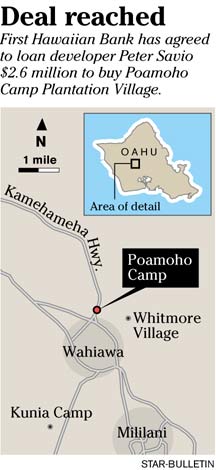CEO and president, First Hawaiian Bank
Plantation homes
win a round
First Hawaiian Bank will lend
$2.6 million to a Poamoho ally
First Hawaiian Bank has agreed to lend developer Peter Savio $2.6 million to buy the land under Poamoho Camp so he can eventually sell the vintage plantation homes back to the residents.
![]()

"They all were not interested. They saw the problems. They didn't see the solutions," Savio said.
The problems stem from the fact that the camp was constructed before county building codes were established. There are no fire hydrants; the roads have no sidewalks or drainage gutters; and the camp is not connected to the city's sewer system. Sewage from each of the 63 homes flows into their own cesspools.
Horner said he decided to offer the loan after visiting the camp with Savio.
"I come from a place not too different from this, a small town in North Carolina. And I looked in the people's eyes, the people who live here, and I saw nothing but pride," Horner said.
The money will be used to purchase a 90-acre lot on which the camp sits from landowner George Galbraith Trust. The camp occupies 34 acres. The rest of the acreage is still in pineapple production but will soon have its final harvest.
Savio said he believes he can sell the plantation homes to the residents for between $25,000 and $50,000 a unit depending on the amount of home and infrastructure improvements the city requires and whether he sells off the agricultural portion of the lot to subsidize the home purchases.
But before he can sell any homes, Savio will need approval to designate the camp as either a subdivision or a condominium.
He said he prefers having the camp designated a condominium, which will allow him to avoid bringing the camp and the homes up to current building codes. Savio lobbied Mayor Mufi Hannemann, who attended yesterday's ceremony.
Hannemann has pledged his support for the Poamoho residents.
"Whatever we do, I'd like to do a community-based planning process with (the residents) and make sure that whatever is being proposed is something that they really do support and want," Hannemann said.
The 300 people who live in Poamoho believed they could continue living in the camp at least until 2007, when the Galbraith Trust is scheduled to be liquidated.
But early last year, Del Monte informed Galbraith trustee Bank of Hawaii that it did not intend to extend its lease on the trust's 2,200 acres outside Wahiawa, including the camp, past June 2004. The company also gave the residents, who are employees, retirees and their families, 120-day notices to vacate their plantation homes. According to its lease, Del Monte needed to raze the homes before returning the property to the trust.
Days before the eviction deadline, Savio announced he had acquired the lease for the camp pending his purchase of the land.
E-mail to City Desk
[News] [Business] [Features] [Sports] [Editorial] [Do It Electric!]
[Classified Ads] [Search] [Subscribe] [Info] [Letter to Editor]
[Feedback]
